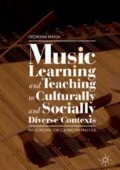Abstract
For some time research has purported to the fact that society and culture influences music itself. It has been further argued that the ways in which music is learnt and taught can reflect nuanced socio-cultural aspects. This chapter explores how beliefs and values are reflected in the music learning and teaching contexts. Socio-cultural influences can alter the ways in which teachers teach from one context to the other but more profoundly the culture frames a range of behaviours within the learning context, just as they influenced the methods of teaching and modes of communication. Socio-cultural elements are embedded within music learning and teaching across all situations and can change regularly or uphold tradition over time.
Access this chapter
Tax calculation will be finalised at checkout
Purchases are for personal use only
References
Campbell, P. S. (1991). Lessons from the world: A cross-cultural guide to music teaching and learning. New York: Schirmer Books.
Ellis, C. J. (1985). Aboriginal music education for living: Cross-cultural experiences from south Australia. St Lucia, QLD: University of Queensland Press.
Greenhow, C., Robelia, B., & Hughes, J. (2009). Learning, teaching, and scholarship in a digital age: Web 2.0 and classroom research: What path should we take now? Educational Researcher, 38(4), 246–259.
Lean, B. (1997). Strategies to overcome the low status of music in the curriculum. In XI conference proceedings: New sounds for a new century (pp. 165–171). Brisbane, Australia: Australian Society for Music Education.
Lierse, A. (1997). Music in schools in the 20th century: An endangered species? In XI conference proceedings: New sounds for a new century (pp. 178–183). Brisbane, Australia: Australian Society for Music Education.
Lonie, D., & Dickens, L. (2015). Becoming musicians: Situating young people’s experiences of music learning between formal, informal and non-formal spheres. Cultural Geographies, 23(1), 87–101.
McAllester, D. P. (1984). A problem in ethics. In J. C. Kassler & J. Stubington (Eds.), Problems and solutions: Occasional essays in musicology presented to Alice M. Moyle (pp. 279–289). Sydney, Australia: Hale and Iremonger.
Mehta, S. (1982). Revolution and the status of women in India. Delhi: Metropolitan.
Merriam, A. P. (1964). The anthropology of music. Evanston, IL: Northwestern University Press.
Pesch, L. (1999). The illustrated companion to south Indian classical music. New Delhi and Oxford: Oxford University Press.
Prensky, M. (2001). Digital natives, digital immigrants. Journal Horizon, 9(5), 1–6.
Roulston, K. (2000). Itinerant music teachers’ work in Queensland. Unpublished PhD thesis, University of Queensland, St Lucia, QLD.
Salavuo, M. (2008). Social media as an opportunity for pedagogical change in music education. Journal of Music, Technology & Education, 1(2–3), 121–136.
Sambamurthy, P. (1990). South Indian music—Books I–VI. Madras, India: The Indian Music Publishing House.
Shankar, R. (1969). My music, my life. New Delhi: Vikas Publishing House Pty. Ltd.
Shankar, V. (1983). The art and science of Karnatic music. Madras, India: The Music Academy.
Stowasser, H. (1992). The development of the music curriculum in Queensland secondary schools: A microcosmic view. In W. Bebbington (Ed.), Sound and reason: Music essays in honour of Gordon D. Spearritt. St Lucia, QLD: University of Queensland.
Théberge, P. (1997). Any sound you can imagine: Making music/consuming technology. Hanover and London: Wesleyan University Press.
Viswanathan, T. (1977). The analysis of rāga ālāpana in South Indian music. Asian Music, 9(1), 13–71.
Wade, B. C. (2001). Music in India: The classical traditions. Englewood Cliffs, NJ: Prentice Hall.
Walker, R. (1990). Musical beliefs: Psychoacoustic, mythical and educational perspectives. New York and London: Teachers College Press Columbia University.
Walker, R. (2001). The rise and fall of philosophies of music education: Looking backwards in order to see ahead. Research Studies in Music Education, 17(1), 3–18.
Author information
Authors and Affiliations
Rights and permissions
Copyright information
© 2018 The Author(s)
About this chapter
Cite this chapter
Barton, G. (2018). Socio-cultural Influences on Music Learning and Teaching. In: Music Learning and Teaching in Culturally and Socially Diverse Contexts. Palgrave Macmillan, Cham. https://doi.org/10.1007/978-3-319-95408-0_8
Download citation
DOI: https://doi.org/10.1007/978-3-319-95408-0_8
Published:
Publisher Name: Palgrave Macmillan, Cham
Print ISBN: 978-3-319-95407-3
Online ISBN: 978-3-319-95408-0
eBook Packages: EducationEducation (R0)

